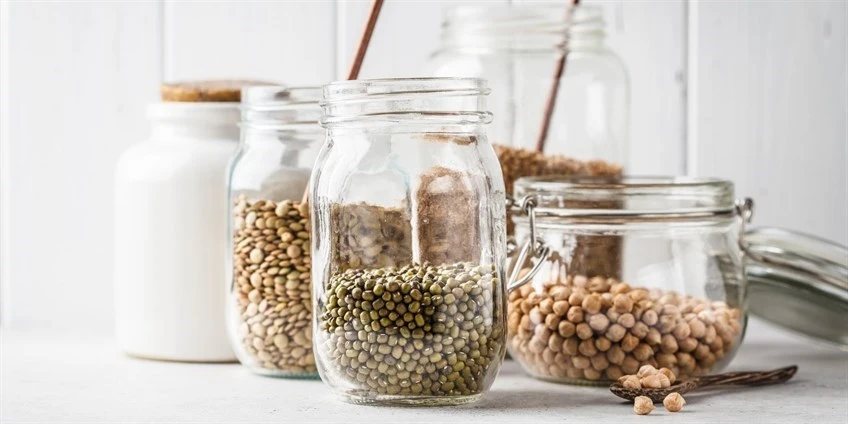Are you considering trialing a vegan lifestyle but concerned with how it may affect your gut health? Maybe you’ve started the transition and your digestive system is struggling?
As a nutritional therapist specialising in gut health, I know how dealing with poor digestion is downright miserable. By reading this blog, you’ll discover how to navigate those difficulties.
Here are some vegan staple foods that commonly cause digestive upset and how to adapt them to make your tummy happy.
Grains
Grains can have a pro-inflammatory effect on the digestive system. Gluten contributes to digestive disharmony in many people. This can commonly cause cramps, wind and gas as well as have systemic effects outside the digestive tract.
Solution:
- Reduce reliance on gluten grains (wheat, spelt, seitan) to reduce the potential inflammatory effect.
- Widen variety of non-gluten grains such as brown rice, quinoa and buckwheat to increase variety of nutrients.
- Widen variety of grain-free flours such as coconut and almond flour for baking for further variety and less reliance on even non-gluten grains.
Legumes
Got gas? It’s very likely these innocent-looking legumes are causing this! Legumes include chickpeas, beans, lentils, alfalfa, peas and peanuts. These long-chain carbohydrates are well known for causing fermentation in the gut causing cramps, flatulence and trapped wind.
Solution:
- Digesting legumes is often dose-dependent – find your level. Half a plate may make you extremely unsociable, while a quarter of a plate may be just fine.
- Substitute half your legumes for more veg; root veg such as sweet potato, squash, beets or pumpkin are good options.
- Substitute legumes with seeds such as flax and chia seeds for a higher protein swap than veg.
- It’s also worth rinsing and soaking your beans before you cook them well. Soft beans mean easier digestion!
Veg
You should aim for veg to account for at least 50% of your diet. Not relying too heavily on grains and legumes as a vegan, probably means increasing your veg quite significantly.
Cruciferous veg such as broccoli, cauliflower, cabbage and Brussels sprouts are nutritionally-dense and absolutely brilliant to have in your diet. However, they can generate large amount of gas causing boating and flatulence.
Solution:
- Cruciferous veg can be dose-dependent, like legumes – so try lower amounts.
- Swap some of your cruciferous veg for leafy greens such as spinach, chard and kale.
- Increase veg slowly to give your gut bacteria time to adjust to its new food source.
- Favour Low FODMAP veg – these are carbohydrates that ferment less in the digestive tract.
Fruit
It’s too easy on a vegan diet to go mad on fruit. Fruit likes a quick passage through the digestive system. When it gets stuck behind slower-digesting foods it can ferment quickly causing gas, cramps and bloating. Eating fruit for dessert is one of the sure-fire ways to get digestive discomfort!
Solution:
- Eat fruit away from meals.
- Favour easily-digested fruit such as berries, ripe bananas and stewed apple.
- Papayas and pineapple have naturally-occurring digestive enzymes which are often well-tolerated.
Nuts
Nuts are an important choice of protein, fat, vitamins and minerals for vegans. However, they can be a bit rough on the digestive tract when eaten whole.
Solution:
- Eat nuts as nut butters.
- If you make your own nut butter, then you can pre-soak the nuts for easier digestion.
- Peanuts are not nuts – they are legumes – try almond, cashew or hazelnut butters.
Processed foods
There is a large market now for vegan convenience foods, both savoury and sweet. Seitan is a popular meat alternative, known as “wheat meat”. As well as being a gluten grain, it may come processed with emulsifiers, additives, fillers and sugars that can cause havoc to your gut. Ingredients in vegan convenience foods that may cause problems include xanthan gum, guar gum, inulin, carrageenan and sugar alcohols (that often end in ‘ol’ such as xylitol and erithrytol).
Solution:
- Limit use of processed foods with unnecessary ingredients.
- Focus on home-made vegan cooking.
- I recommend Pulsin bars to my clients for their wholesome, natural ingredients.
- Use your new vegan lifestyle as an opportunity to learn to cook from scratch.
Summary
My aim for my clients is to have the widest variety of foods possible in their diet without causing any symptoms. You’ll note these suggestions don’t ban any food groups, which is important when you are already eliminating animal products and help with your vegan digestion.
But it does require you to experiment with ratios or make tweaks to find out what suits your tummy. If your tummy is happy, then you’ll be digesting and absorbing the nutrients from your food to keep you well and healthy on a vegan diet.

